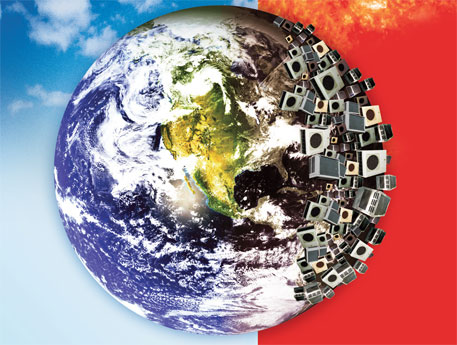a major development in the ongoing negotiations in Kigali, Rwanda to phase down hydro-fluorocarbons (HFCs), the Indian government has unveiled a domestic legislation that mandates control on the emissions of trifluoro-methane (HFC-23), which is a super greenhouse gas.
HFC-23 is released as a by-product during the manufacturing of a commonly used refrigerant gas, chloro-difluoromethane (HCFC-22). The global warming potential of HFC-23 is 14,800 times more than that of CO2, making it an extremely potent greenhouse gas.
The legislation requires five Indian companies which manufacture HCFC-22 to capture and then incinerate
HFC-23 so that its release into the atmosphere is eliminated. This will potentially avoid emissions of
HFC-23 equivalent to 100 million tonne of CO2 over the next 15 years.
A Centre for Science & Environment (CSE) report notes that the five Indian companies, along with 19 other companies which are mainly in China, have received funds and set up incinerators under the Clean Development Mechanism (CDM) of the United Nations Framework Convention on Climate Change (UNFCCC). During 2007-2013, they destroyed the gas and sold the carbon credits to developed countries under CDM. For every tonne of HFC-23 destroyed, they earned 14,800 carbon credits which translated into billions of dollars. Once the CDM mechanism was discontinued, these companies had no incentives to destroy HFC-23.
Since the collapse of the CDM market, the levels of HFC-23 in the atmosphere have increased. This indicates that HCFC-22 industries continue to emit HFC-23. Estimates show that in the business-as-usual scenario, all the HCFC-22 manufacturing units in the world will release more than 2 billion tonne of CO2 equivalent of HFC-23 into the atmosphere by 2020. Most of this release will happen in China. However, the domestic legislation of India now ensures that the Indian companies will operate the incinerators and destroy HFC-23.
“Asking for money to destroy HFC-23, when these companies have made so much money from it in the past, is unfair. By enacting a law to make it mandatory for the companies to destroy HFCs, India has shown leadership in dealing with HFC issue. Other developing countries should also follow suit,” said a CSE official.
Godrej Complies
Godrej Appliances, one of India’s leading players in the home appliances segment, welcomed the finalization by more than 100 countries of an amendment to the Montreal Protocol in Kigali, Rwanda. This amendment will enable this 1987 ozone-protecting agreement to phase-out the use of Hydrofluorocarbons (HFCs), a class of gases that are several thousand times more damaging than carbon dioxide.
The company says it has set a number of benchmarks for the industry including the launch of the first green refrigerator in India (2002), the first 5 star range of DC refrigerators (2008), first green AC in the world (2012), the first green refrigerator with 6 Star Performance(2012), India’s first ACs with 7-star performance and the Greenest Inverter ACs in India.







